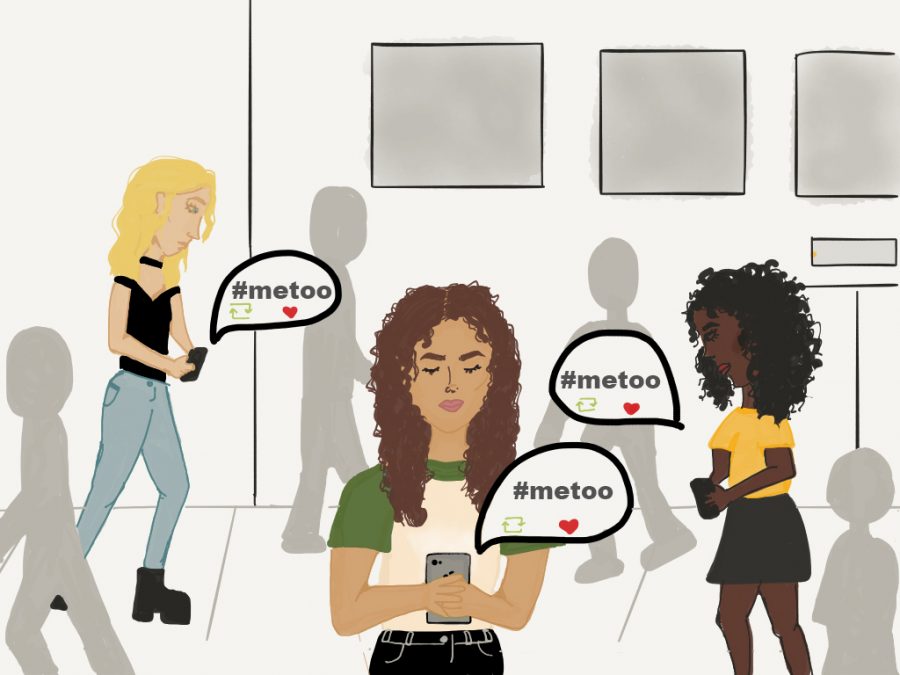#MeToo: Will the movement make a difference?
November 14, 2017
In the wake of the Harvey Weinstein sexual assault revelation, women have come out in droves on social media, sharing their stories of sexual assault and harassment with the hashtag #MeToo.
The number of stories is staggering. Thousands of women have given detailed, fiery testimony, and the movement has continued to gain momentum, with more allegations against other powerful men coming to light.
Under #MeToo, women stand together, but what do we stand for? Similar hashtag-driven movements have stalled in the past, including the #YesAllWomen movement that started in 2014 after the misogyny-driven Isla Vista killings. The routine is becoming familiar: after a catalyzing instance of violence against women, we flock to social media, desperate for solace and solidarity. We mobilize. We shout our stories from the rooftops in hopes that powers greater than our own will pick up our testimony. For a while, the world seems to recognize our pain.
After a few months, people forget.
Why should women have to dredge the depths of their most painful memories for us to recognize that our society has a problem? Why is the onus on women to stand up again and again, to teach men boundaries by pushing our own?
Society is always shocked by the sheer volume of women who have stories to tell. It’s an unfathomable truth to contemplate: according to the Rape, Abuse & Incest National Network, one out of every six women in America has been raped. Unfortunately, we often fail to contemplate what, exactly, those statistics mean for men. There are no statistics on how many men are rapists; the very idea sounds absurd, yet women are not assaulted in vacuums. Instead of placing the blame squarely on the shoulders of rapists, we default to passive voice. Women are raped. Subject, linking verb, past participle.
The language we use to talk about sexual violence removes all blame. Rape is an occurrence, not a crime with a perpetrator. We can break it down to the facts and the numbers, but we still can’t stomach the fact that if one sixth of American women have been raped — 17.7 million women — a similar number of men are rapists. It’s an ugly, universal truth, but it’s one that informs how we teach girls to navigate the world. I have learned that sexual harassment is an ever-present threat, inescapable and heartbreakingly prevalent.
If a woman can’t be taught caution, she will be taught fear.
Without confronting these difficult truths, our stories will never have a lasting impact. For many people who are shocked by the #MeToo posts, these testimonies are too horrible to imagine, but for a vast number of women, the stories are all too familiar. My greatest fear is that Harvey Weinstein’s downfall, and the subsequent downfall of other sexual predators, will be used as a shield against lasting change. We excised Weinstein, haven’t we fixed sexual harassment?
In the weeks following the Weinstein scandal, many more women have named their high-profile harassers, and their accusations have garnered attention. As evidenced by Weinstein’s expulsion from the Academy of Motion Picture Arts and Sciences, and by film director Brett Ratner’s dismissal from Warner Bros. after sexual harassment accusations from six women, we as a society are allowing the spotlight to linger on sexual harassment, and the crimes it has exposed are not going unnoticed or unpunished.
As with all movements, the media exposure will fade. The only way #MeToo will change our society is if it demands radical change, from the ground up. Teach your sons that women’s bodies are not theirs for the taking. Create an environment in which your daughters can freely speak out. Keep telling your stories, knowing that they may fall on deaf ears, but they might also plant the seed of change.





